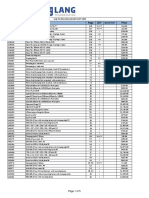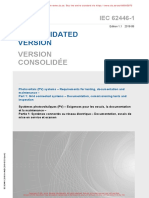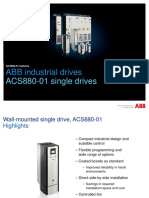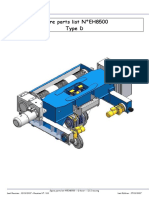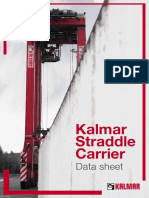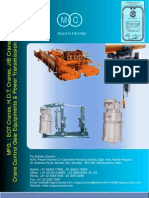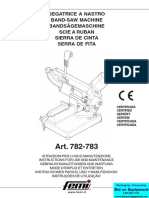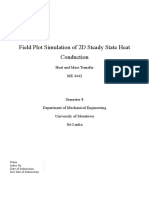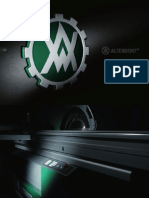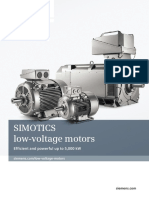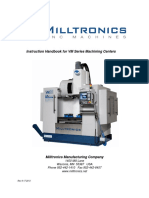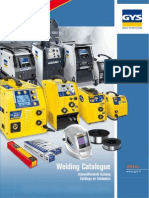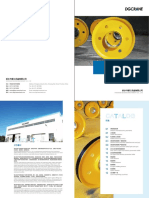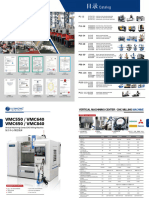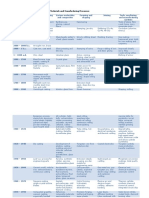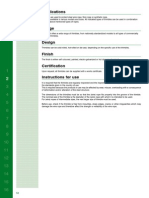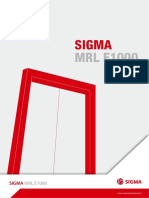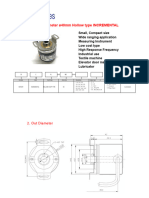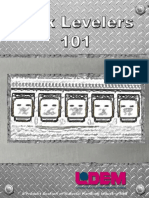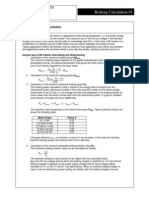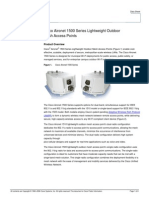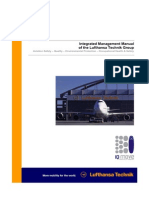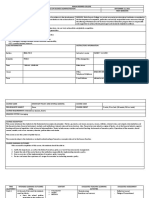Braking Unit
Braking Unit
Uploaded by
gafscottCopyright:
Available Formats
Braking Unit
Braking Unit
Uploaded by
gafscottOriginal Title
Copyright
Available Formats
Share this document
Did you find this document useful?
Is this content inappropriate?
Copyright:
Available Formats
Braking Unit
Braking Unit
Uploaded by
gafscottCopyright:
Available Formats
Betriebsanleitung / Operating Instructions
Ausgabe/Edition: AG
simovert
Bremseinheit / Braking Unit
masterdrives
General
03.2004
Contents
1 Definitions and Warnings ...............................................................................1-1
Product Description ........................................................................................2-1
3 3.1 3.2 3.3 3.4
Mounting, Connecting-up...............................................................................3-1 Dimension drawings ..........................................................................................3-3 Power terminals.................................................................................................3-5 Control terminal X38..........................................................................................3-7 Examples for connection ...................................................................................3-8
4 4.1
Braking Resistors............................................................................................4-1 Definitions of the power ratings .........................................................................4-2
Monitoring ........................................................................................................5-1
6 6.1
Start-up.............................................................................................................6-1 Capacitor forming ..............................................................................................6-3
Technical Data .................................................................................................7-1
Siemens AG 6SE7087-6CX87-2DA0 SIMOVERT MASTERDRIVES Bremseinheit / Braking Unit
0-1
03.2004
Definitions and Warnings
Definitions and Warnings
For the purpose of this documentation and the product warning labels, a "Qualified person" is someone who is familiar with the installation, mounting, start-up, operation and maintenance of the product. He or she must have the following qualifications:
Trained or authorized to energize, de-energize, ground and tag circuits and equipment in accordance with established safety procedures. Trained or authorized in the proper care and use of protective equipment in accordance with established safety procedures. Trained in rendering first aid.
Qualified personnel
DANGER
indicates an imminently hazardous situation which, if not avoided, will result in death, serious injury and considerable damage to property.
WARNING
indicates a potentially hazardous situation which, if not avoided, could result in death, serious injury and considerable damage to property.
CAUTION
used with the safety alert symbol indicates a potentially hazardous situation which, if not avoided, may result in minor or moderate injury.
CAUTION
used without safety alert symbol indicates a potentially hazardous situation which, if not avoided, may result in property damage.
NOTICE
NOTICE used without the safety alert symbol indicates a potential situation which, if not avoided, may result in an undesireable result or state.
NOTE
For the purpose of this documentation, "Note" indicates important information about the product or about the respective part of the documentation which is essential to highlight.
Siemens AG 6SE7087-6CX87-2DA0 SIMOVERT MASTERDRIVES Bremseinheit / Braking Unit
1-1
Definitions and Warnings
03.2004
WARNING
Hazardous voltages are present in this electrical equipment during operation. Non-observance of the warnings can thus result in severe personal injury or property damage. Only qualified personnel should work on or around the equipment This personnel must be thoroughly familiar with all warning and maintenance procedures contained in this documentation. The successful and safe operation of this equipment is dependent on correct transport, proper storage and installation as well as careful operation and maintenance.
NOTE
This documentation does not purport to cover all details on all types of the product, nor to provide for every possible contingency to be met in connection with installation, operation or maintenance. Should further information be desired or should particular problems arise which are not covered sufficiently for the purchaser's purposes, the matter should be referred to the local SIEMENS sales office. The contents of this documentation shall not become part of or modify any prior or existing agreement, commitment or relationship. The sales contract contains the entire obligation of SIEMENS AG. The warranty contained in the contract between the parties is the sole warranty of SIEMENS AG. Any statements contained herein do not create new warranties or modify the existing warranty.
1-2
6SE7087-6CX87-2DA0 Siemens AG Bremseinheit / Braking Unit SIMOVERT MASTERDRIVES
03.2004
Definitions and Warnings
CAUTION
Components which can be destroyed by electrostatic discharge (ESD)
The converters contain components which can be destroyed by electrostatic discharge. These components can be easily destroyed if not carefully handled. If you have to handle electronic boards please observe the following: Electronic boards should only be touched when absolutely necessary The human body must be electrically discharged before touching an electronic board Boards must not come into contact with highly insulating materials - e.g. plastic foils, insulated desktops, articles of clothing manufactured from man-made fibers Boards must only be placed on conductive surfaces When soldering, the soldering iron tip must be grounded Boards and components should only be stored and transported in conductive packaging (e.g. metalized plastic boxes, metal containers) If the packing material is not conductive, the boards must be wrapped with a conductive packaging material, e.g. conductive foam rubber or household aluminum foil. The necessary ECB protective measures are clearly shown in the following diagram: a = Conductive floor surface b = ESD table c = ESD shoes d = ESD overall e = ESD chain f = Cubicle ground connection
b e
d b e f f c a f f c a f d
c Sitting
Standing
Standing / Sitting
Siemens AG 6SE7087-6CX87-2DA0 SIMOVERT MASTERDRIVES Bremseinheit / Braking Unit
1-3
03.2004
Product Description
Product Description
Electric energy is fed into SIMOVERT MASTERDRIVES when a motor is decelerated. In order to prevent overvoltage tripping, a braking resistor is used to convert this energy into heat. This resistor may be a part of the braking unit or it is connected to it. The braking unit is connected to the DC bus terminals of the drive. When the DC bus voltage reaches a pre-defined limit, the braking unit automatically turns on and prevents the DC bus voltage from continuing to increase. The braking unit operates autonomously. The power supply of the electronics is integrated in the unit. The braking unit is available in three frame sizes.
frame size S, 5 kW to 10 kW: integrated braking resistor: for short braking operation external braking resistor: if the integrated braking resistor is not sufficient frame size A, 10 kW to 20 kW: integrated braking resistor: for short braking operation external braking resistor: if the integrated braking resistor is not sufficient 50 kW: external braking resistor frame size B,
100 kW to 200 kW: external braking resistor
Siemens AG 6SE7087-6CX87-2DA0 SIMOVERT MASTERDRIVES Bremseinheit / Braking Unit
2-1
05.2004
Mounting, Connecting-up
3
Mounting
Mounting, Connecting-up
Braking units are mounted next to SIMOVERT MASTERDRIVES on a G rail or using M6 screws. Braking unit: Connect the terminals C/L+ and D/L- (top side of the braking unit) to the terminals C/L+ and D/L- of the drive (see Fig. 3-1). The connecting cables should be max. 3 m long and twisted. For several inverters in parallel with a common DC bus, the braking unit should be connected to the inverter with the highest rating. Connecting braking units in parallel: Only braking units with the same ratings or the next highest or next lowest rating (see Table 7-1) may be connected in parallel. Each braking unit must have its own twisted feeder cable, max. length 3 m. External braking resistors (selection list see chapter "Braking Resistors") 5 kW to 20 kW
Connecting-up
Disconnect jumper between terminals H1 and H2, connect resistor to Terminals G and H2. Connect the resistor to terminals G and H.
50 kW to 200 kW
Length of the connecting cables between braking unit and external braking resistor < 15 m.
WARNING
Mis-connecting or shorting the DC bus terminals will destroy the drive and the braking unit, respectively. 5 kW to 20 kW If an external resistor is connected, the jumper between H1 and H2 must be removed, otherwise the unit or the braking unit may be destroyed!
For braking units with an internal brake resistor, the air discharge temperature can be > 80 C.
Siemens AG 6SE7087-6CX87-2DA0 SIMOVERT MASTERDRIVES Bremseinheit / Braking Unit
3-1
Mounting, Connecting-up
05.2004
X1
X3 CD
-A mp.
X3
CD
-L o a d -T e m p .
Read y
Reset
Braking Unit SIMOVERT MASTERDRIVES
G H2 X6
X2
Ext. Braking Resistor
Fig. 3-1
Connection of the braking unit
3-2
6SE7087-6CX87-2DA0 Siemens AG Bremseinheit / Braking Unit SIMOVERT MASTERDRIVES
3.1
05.2004
Frame S
2) 45 50 Exhaust air Displays 2) X3
-Amp. -Load -Temp. Ready
Frame A
3) 100 3) 100
1) 125 1) Mounting hole for screw M6.
22.5
1)
125
55
35
X3 Exhaust air
Displays
35
2) Hook (suspension) for mounting on a G rail according to EN50035. 3) Space required for cooling the unit 100 mm
-Amp. -Load -Temp. Ready
500
475
475
425
427
425
427
Dimension drawings
X6 X6 X38
1003)
45 90
Dimension drawing types S and A
350
350
Display Terminals
100
1)
45 1)
40 Air intake
105
40 85
Air intake
3)
Siemens AG 6SE7087-6CX87-2DA0 SIMOVERT MASTERDRIVES Bremseinheit / Braking Unit
Reset
X38
500
Fig. 3-2
Weight: approx. 11 kg 10 X6 C/L+ D/L12 34 5 G H1 H2 X38 X3 C D L+ LPE1
Reset
Weight: approx. 6 kg
Dimension: mm
10
-Amp.
X3
X6
O V E R
-Load
-Temp.
Ready
Reset
G H1 H2 PE2
Mounting, Connecting-up
3-3
85
3) 100
35
475
425
500
427
1) 350
6SE7087-6CX87-2DA0 Siemens AG Bremseinheit / Braking Unit SIMOVERT MASTERDRIVES
Y X38
90 135
3) 100
3-4
X 1) Mounting hole for screw M6. C/L+ D/LH/RPE2 PE1 2) Hook (suspension) for mounting on a G rail according to EN50035. Exhaust air G/R+ Z 2 3) Space required for cooling the unit. When using the option a space of 100 mm is required X Y Z Dimension: mm Weight: approx. 18 kg 55 Displays X38 -Amp.
O V E R
Frame B
45
45
Mounting, Connecting-up
1)
Fig. 3-3
-Load -Temp. Ready Air intake 40 Reset
Displays
-Amp. -Load -Temp. Ready
Reset
Dimension drawing type B
Terminals
1 23 45
10
05.2004
05.2004
Mounting, Connecting-up
3.2
Power terminals
Construction type S Construction type A Terminal Tightening torque [Nm / lbf ft] 2 / 1.5 2 / 1.5 6 / 4.4 Construction type B Terminal Tightening torque [Nm / lbf ft] 13 / 9.6 13 / 9.6 10 / 7.4
Connection
Terminal
Tightening torque [Nm / lbf ft] 0.5 / 0.37 0.5 / 0.37 0.5 / 0.37
C/+ D/-
Input Input Shielding
X3:1 X3:3 X3:5
X3:2 X3:3 M5 screw on top of housing X3:4
Busbar C/L+ Busbar D/LM6 screw on top of housing Busbar PE1
PE1
M5 screw on top of housing external braking resistor internal braking resistor external braking resistor X6:1 X6:3 X6:5 X6:7
6 / 4.4
2 / 1.5
13 / 9.6
G H1 H2 / H
0.5 / 0.37 0.5 / 0.37 0.5 / 0.37 0.5 / 0.37
X6:1 X6:2 X6:3 M5 screw on bottom of housing X6:4
2 / 1.5 2 / 1.5 2 / 1.5 6 / 4.4
Busbar G / R+
13 / 9.6
Busbar H / RM6 screw on top of housing Busbar PE2
13 / 9.6 10 / 7.4
Shielding PE2
M5 screw on bottom of housing
6 / 4.4
2 / 1.5
13 / 9.6
Connection via Connectable conductor crosssection (stranded): VDE (mm2) AWG
Terminal strip 1.5 to 4
Terminal strip 2.5 to 10
Cable lug according to DIN 46235 and M8 screws max. 1 x 95 or 2 x 70
16 to 10
14 to 6
max. 1 x 000
NOTE
AWG: American Wire Gauge Recommended conductor cross-sections: see Table 7-1.
Table 3-1 Power terminals of the braking unit
WARNING
The braking unit may be connected to the DC bus bar with or without using fuses. The connections between the drive converter and braking unit must be short-circuit- and ground-fault proof. The voltage withstand capability of the cable must be according to the line voltage.
Siemens AG 6SE7087-6CX87-2DA0 SIMOVERT MASTERDRIVES Bremseinheit / Braking Unit
3-5
Mounting, Connecting-up
05.2004
Fuses
It is recommended that fuses be used for multi-motor systems using a common DC bus (incoming power > > braking unit rating). High voltage fuses (1000 V) must be used in the positive and negative branches (fuse type see Table 7-1). Fuses are not required for single-motor drives (one inverter for each braking unit).
NOTE
These fuses only provide protection in critical situations. They do not protect the braking unit or external brake resistor.
3-6
6SE7087-6CX87-2DA0 Siemens AG Bremseinheit / Braking Unit SIMOVERT MASTERDRIVES
05.2004
Mounting, Connecting-up
3.3
Control terminal X38
The braking unit has an inhibit input and a fault output.
Inhibit input
Pin 1 (+) and Pin 2 (-) Connecting 24 V DC: locks the braking unit Acknowledge "OVERAMP" and "OVERTEMP" faults Pin 4 and 5 Relay contact closed: no fault Relay contact open: fault (see chapter 5 "Monitoring") or braking unit locked (Inhibit) or no DC bus voltage applied 0.08 1.5 mm2 / AWG 28 16 0.22 0.25 Nm / 0.16 0.18 lbf ft
Fault output
Connectable cross-section: Tightening torque:
NOTE
Control terminals need not be connected for proper operation of the braking unit. Relay load current capability: 1 A at 230 V AC (overvoltage category II) 1 A at 24 V DC
Siemens AG 6SE7087-6CX87-2DA0 SIMOVERT MASTERDRIVES Bremseinheit / Braking Unit
3-7
Mounting, Connecting-up
05.2004
3.4
Examples for connection
Frame S and A PE1 C/L+D/LC/L+ D/LFrame B PE1
O V E R
AMP LOAD TEMP READY RESET
O V E R
AMP LOAD TEMP READY RESET
-X38 1 2 3 4 5
PE
-X38 1 2 3 4 5
PE
G H1 H2 PE2
PE2
Fig. 3-4
General schematic diagrams
230 V
Frame S and A (5 kW - 20 KW)
-X3: C / L+ SIMOVERT MASTERDRIVES -X3: C/L+ -X6: G H1 H2
230 V
Frame B (50 kW - 200 KW)
-X3: C / L+ SIMOVERT MASTERDRIVES D / L-X9 -X3: C/L+ -X6: G H 1 D/LX38 1 2 2 3 24 V -X101.1 -X101.Y 4 5 Braking Unit External Braking Resistor 4 3
D / L-
D/LX38 1 2 3
-X9
24 V -X101.1
4 Braking Unit
-X101.Y
Y = 3...9 (Binary Input 1 to 7) with P586 = 10, 12, 14, 16, 18, 20 or 22
Y = 3...9 (Binary Input 1 to 7) with P586 = 10, 12, 14, 16, 18, 20 or 22
Fig. 3-5
Drive and braking unit with internal braking resistor and tripping of the drive at faults of the braking unit
Fig. 3-6
Drive and braking unit with external braking resistor and tripping of the drive at faults of the braking unit
CAUTION
The braking unit may not be connected to the live DC bus via a contactor.
3-8
6SE7087-6CX87-2DA0 Siemens AG Bremseinheit / Braking Unit SIMOVERT MASTERDRIVES
03.2004
Braking Resistors
Braking Resistors
The braking resistors listed in chapter 7 "Technical Data" match the braking units and allow full utilization of the braking capability.
WARNINGS
When braking resistors and braking units are combined, it must be guaranteed that the resistance of a resistor is not less than the minimum allowed resistance, otherwise the braking unit may be destroyed! Higher values of the resistors are allowed. Under these circumstances the braking power will be reduced (P = V2/R). During operation the surface of the braking resistors may have temperatures of several hundred degrees C. Therefore cooling air must not contain flammable or explosive items or gases. If a resistor is wall-mounted, the wall must not be flammable.
WARNINGS
The external braking resistors must be installed separately and connected on-site. The listed braking resistors have a thermal contact (NC) which opens at overload of the resistor. This thermal contact can, for example, be connected up to the fault input of the SIMOVERT MASTERDRIVES. If the thermo-contact of the external braking resistor is evaluated, the drive converter must be isolated from the line supply when the contact responds (e.g. by controlling the main contactor via -X9:4,5 (5-pole terminal strip) or -X9:7,9 (9-pole terminal strip).
Siemens AG 6SE7087-6CX87-2DA0 SIMOVERT MASTERDRIVES Bremseinheit / Braking Unit
4-1
Braking Resistors
03.2004
4.1
P20 P3
Definitions of the power ratings
Braking unit with internal resistor P20 P3 = Rated Power = Peak Power = 1.5 P20 = Rated Power = Peak Power = 1.5 P20
P
Braking unit with external resistor
PDB = 0.25 P20 = Steady State Power Rating
PDB = 0.03 P20 = Steady State Power Rating
P
P3
1.5
P3
1.5
P20 1
P20 1
PDB 0.25 0 03 20 23 90 t[s]
PDB 0.03 0 0 1.7 2.5
72.5
t[s]
Fig. 4-1
Load characteristics of the braking units
4-2
6SE7087-6CX87-2DA0 Siemens AG Bremseinheit / Braking Unit SIMOVERT MASTERDRIVES
03.2004
Monitoring
Monitoring
In the case of faults, the braking unit will be locked, the fault relay (X38:4-5) is de-energized. The fault is displayed via LEDs at the front cover of the braking unit.
1 2
Voltage Limit Switch O -AMP V -Load. E R -Temp. Ready Reset
Fig. 5-1
Position of the displays
Displays (LED) i OVERAMP
Description of operating state LED is on during an output short circuit. This fault is not automatically reset. It can be reset via the Reset key or by applying and releasing the Inhibit command. Before resetting the braking unit make sure that the short circuit no longer exists! LED is on when the overload monitoring circuit becomes active (it monitors the duty cycle); if the specified duty cycle is exceeded, the braking unit turns off. The fault is automatically reset after some 70 sec. Cannot be reset with the Reset key or by applying the Inhibit signal. LED is on when the temperature monitoring circuit is active (ambient temperature too high or no sufficient cooling air flow). When the resistor overtemperature LED is lit, this means for braking power 20 kW excess temperature, internal brake resistor braking power 50 kW excess temperature, power semiconductor The fault can be acknowledged when the critical temperature is fallen-below using the reset button or by connecting the inhibit signal.
i OVERLOAD
i OVERTEMP
i READY
LED is on after DC bus voltage is applied to the input terminals. During operation the LED becomes darker with increasing duty cycle (Note: a bright LED shows that additional braking power is available). The LED extinguishes if the braking unit is disabled via the "inhibit" input of the X38 control terminal strip.
Operating elements
Reset key Voltage limit switch
is accessible through the front cover to reset an overcurrent or excess temperature fault is accessible after removing the front cover (see chapter 6 "Start-up").
Siemens AG 6SE7087-6CX87-2DA0 SIMOVERT MASTERDRIVES Bremseinheit / Braking Unit
5-1
03.2004
Start-up
6
DANGER
Start-up
Do not remove the front cover when voltage is applied to the braking unit! The control circuit is directly connected to the DC bus voltage! Therefore the voltage limit switch may only be operated when the braking unit is free of voltage. The units have hazardous voltage levels up to 5 min. after the unit has been powered-down due to the DC link capacitors. Setting of the voltage limit switch: In the case of the braking units, the response threshold can be switched over. This makes sense when a drive is operated from a 380 / 400 V or from a 500 V or 660 V line, because during braking the DC bus voltage increases only slightly. The voltage stress applied to motor insulation will be reduced.
NOTE
For 1 LA 1/5/6/8 type SIEMENS motors the voltage limit does not need to be changed. If the voltage limit switch is set to the lower limit, the braking power is reduced (P~V2).
Siemens AG 6SE7087-6CX87-2DA0 SIMOVERT MASTERDRIVES Bremseinheit / Braking Unit
6-1
Start-up
03.2004
The voltage limit switch is located behind the front cover.
Braking Unit 6SE70__-_C.87-2DA0 Rated Voltage 208 V to 230 V Voltage Limit 387 V Switch position fixed, cannot be changed
1 2 1 2
6SE70__-_E.87-2DA0
380 V to 460 V
774 V (factory setting)
380 V to 400 V
673 V
6SE70__-_F.87-2DA0
500 V to 575 V
967 V (factory setting)
1 2 1 2
500 V
841 V
6SE70__-_H.87-2DA0
660 V to 690 V
1158 V (factory setting)
1 2 1 2
660 V
1070 V
Table 6-1
Setting of the voltage limit switch
Set parameters on converter: (see section headed "Parameterization" in operating manual for SIMOVERT MASTERDRIVES)
P515, Vdmax controller, set parameter value to "0". If the braking unit is to report a fault to the SIMOVERT MASTERDRIVES, "Ext Fault 2" must be used ; e.g. P586 "Src No ext Fault 2"external 2" = 10...22 (binary inputs 1 to 7).
6-2
6SE7087-6CX87-2DA0 Siemens AG Bremseinheit / Braking Unit SIMOVERT MASTERDRIVES
03.2004
Start-up
6.1
Capacitor forming
The DC link capacitors must be re-formed if the converter has been non-operational for more than one year. If the converter was started-up within one year after having been shipped (serial number on the rating plate), it is not necessary to re-form the DC link capacitors. Forming is realized by switching-in a rectifier and resistor, which is connected to the DC link. The converter supply must be disconnected! (circuit: refer to Fig. 6-1.) The forming time is dependent on the time during which the converter was not operational (see Fig. 6-2).
Position 7 Example A B C 06 04 Significance / Example Manufacturing year: 2000 2001 2002
8 and 9 10 and 11 12 to 14
Table 6-2
Manufacturing month: 06 Manufacturing day: 04
Not relevant for forming (serial number)
Serial number structure: NW903160604095
Siemens AG 6SE7087-6CX87-2DA0 SIMOVERT MASTERDRIVES Bremseinheit / Braking Unit
6-3
Start-up
03.2004
Forming
PE1 C/L+ D/L-
O V E R
AMP LOAD TEMP READY RESET
-X38 1 PE
C R
PE2
Recommended components A 208 V < Un < 415 V 380 V < Un < 460 V 500 V < Un < 690 V
Fig. 6-1
R 220 / 100 W 470 / 100 W 680 / 100 W
C 22 nF / 1600 V 22 nF / 1600 V 22 nF / 1600 V
SKD 50 / 12 SKD 62 / 16 SKD 62 / 18
Circuit for forming
6 5 4 3 2 1
Forming time in h
4 5 Non-operational time in years
Fig. 6-2
Forming time as a function of the time during which the converter was non-operational
6-4
6SE7087-6CX87-2DA0 Siemens AG Bremseinheit / Braking Unit SIMOVERT MASTERDRIVES
03.2004
Technical Data
7
Order Number
Technical Data
Power Rating P20 (kW) 5 5 5 10 10 10 20 20 50 50 50 100 100 170 200 200 (V) 387 774 967 387 774 967 387 774 774 967 1158 774 967 774 967 1158 (V) 280 to 310 510 to 620 675 to 780 280 to 310 510 to 620 675 to 780 280 to 310 510 to 620 510 to 620 675 to 780 890 to 930 510 to 620 675 to 780 510 to 620 675 to 780 890 to 930 (A) 7.9 4.0 3.2 16 8 6 32 16 40 32 27 80 64 135 128 107 Voltage Rated DC Limit bus Voltage Ieff Order Number Amps Braking resistor 6SE70... 21-6CS87-2DC0 18-0ES87-2DC0 16-4FS87-2DC0 23-2CS87-2DC0 21-6ES87-2DC0 21-3FS87-2DC0 26-3CS87-2DC0 23-2ES87-2DC0 28-0ES87-2DC0 26-4FS87-2DC0 25-3HS87-2DC0 31-6ES87-2DC0 31-3FS87-2DC0 32-7ES87-2DC0 32-5FS87-2DC0 32-1HS87-2DC0 (:) 20 80 124 10 40 62 5 20 8 12.4 17.8 4 6.2 2.35 3.1 4.45 Cross Section Area Cu cable mm2 1.5 1.5 1.5 2.5 1.5 1.5 10 2.5 10 10 6 35 35 50 50 50 AWG 14 16 16 14 16 16 6 14 6 6 8 0 0 00 00 00 3NE4101 3NE4101 3NE4101 3NE4102 3NE4101 3NE4101 3NE4120 3NE4102 3NE4121 3NE4120 3NE4118 3NE3225 3NE3224 3NE3230-0B 3NE3230-0B 3NE3227 Fuses Type
Braking unit 6SE70... 21-6CS87-2DA0 18-0ES87-2DA0 16-4FS87-2DA0 23-2CA87-2DA0 21-6ES87-2DA0 21-3FS87-2DA0 26-3CA87-2DA0 23-2EA87-2DA0 28-0EA87-2DA0 26-4FA87-2DA0 25-3HA87-2DA0 31-6EB87-2DA0 31-3FB87-2DA0 32-7EB87-2DA0 32-5FB87-2DA0 32-1HB87-2DA0
NOTE
Load resistor: Resistance value 10 %, exception 6SE7032-7ES87-2DC0 8 %
Table 7-1 Technical Data
NOTE
The connection cross-sections have been determined for copper cables at an ambient temperature of 40 C (104 F) and for cables with a permissible conductor operating temperature of 70 C (as per DIN VDE 0298-4 / 08.03).
Frame Size Width S A B
Table 7-2
Size (mm) Height 427 427 427 Depth 350 350 350
Weight (kg)
Degree of protection
Cooling
45 90 135
6 11 18
IP20 IP20 IP20
self cooling self cooling self cooling
Technical Data
Siemens AG 6SE7087-6CX87-2DA0 SIMOVERT MASTERDRIVES Bremseinheit / Braking Unit
7-1
Technical Data
03.2004
Cabinet - roof mounting
145
PE 5.5 x 8
525 15 540
150 180
Wall mounting (electrical connection to the left)
Multi-element resistor MF2 Airflow (convection)
Brake resistor for 5 kW; 20 5 kW; 80 5 kW; 124
Fig. 7-1
Type 6SE7021-6CS87-2DC0 6SE7018-0ES87-2DC0 6SE7016-4FS87-2DC0
Mounting diagram, braking resistor
7-2
6SE7087-6CX87-2DA0 Siemens AG Bremseinheit / Braking Unit SIMOVERT MASTERDRIVES
03.2004
Technical Data
Cabinet - roof mounting
145
PE 5.5 x 8 330 360
525 15 540
Wall mounting (electrical connection to the left)
Multi-element resistor MF4
Airflow (convection)
Brake resistor for 10 kW; 10 10 kW; 40 10 kW; 62
Fig. 7-2
Type 6SE7023-2CS87-2DC0 6SE7021-6SE87-2DC0 6SE7021-3FS87-2DC0
Mounting diagram, brake resistor
Siemens AG 6SE7087-6CX87-2DA0 SIMOVERT MASTERDRIVES Bremseinheit / Braking Unit
7-3
Technical Data
03.2004
Floor mounting T1 / T2 2 Socket terminal, 2.5 mm
100
305
100
100
Pg11
Pg21
380 485
400 430 M6
Stud terminals, M6
400
380 Wall mounting
100 380 Pg 100 Box dimensions: 450 x 500 x 320
Brake resistor for 20 kW; 5 20 kW; 20 20 kW; 31 20 kW; 44.4
Fig. 7-3
100
400
Type 6SE7026-3CS87-2DC0 6SE7023-2ES87-2DC0 6SE7022-5FS87-2DC0 6SE7022-1HS87-2DC0
Weight, approx. 15 kg 17 kg 17 kg 16 kg
Mounting diagram, brake resistor for floor and wall mounting
7-4
6SE7087-6CX87-2DA0 Siemens AG Bremseinheit / Braking Unit SIMOVERT MASTERDRIVES
03.2004
Technical Data
Floor mounting 100 T1 / T2 Socket terminal, 2.5 mm2
305
100
100
Pg11
Pg21
380 485
710 740 M8
Stud terminals, M6
400
380
Wall mounting 100 710
100 380 Pg 100 Box dimensions: 760 x 500 x 320
Brake resistor for 50 kW; 8 50 kW; 12.4 50 kW; 17.8
Fig. 7-4
Type 6SE7028-0ES87-2DC0 6SE7026-4FS87-2DC0 6SE7025-3HS87-2DC0
Weight, approx. 27 kg 27 kg 28 kg
Mounting diagram, brake resistor for floor and wall mounting
Siemens AG 6SE7087-6CX87-2DA0 SIMOVERT MASTERDRIVES Bremseinheit / Braking Unit
7-5
Technical Data
03.2004
200
605
T1 / T2 Socket terminal 2.5 mm 2
200
200
Pg11
Pg21
380 485
710 740 M8
Stud terminals, M6
710
Box dimensions: 760 x 500 x 320 380
Brake resistor for 100 kW; 4 100 kW; 6.2 100 kW; 8.9
Fig. 7-5
Type 6SE7031-6ES87-2DC0 6SE7031-3FS87-2DC0 6SE7025-1HS87-2DC0
Weight, approx. 47 kg 43 kg 45 kg
Mounting diagram, brake resistor
7-6
6SE7087-6CX87-2DA0 Siemens AG Bremseinheit / Braking Unit SIMOVERT MASTERDRIVES
03.2004
Technical Data
200
200
200
1325
Pg11 Pg36
380 485
10,5
710 740 755
T1 / T2 Socket terminal 2.5 mm 2 M12
Stud terminals, M12
710
Box dimensions:
Folding box 760 x 500 x 1350 on Euro-pallet
380
Brake resistor for 170 kW; 2.35 200 kW; 3.1 200 kW; 4.45
Fig. 7-6
Type 6SE7032-7ES87-2DC0 6SE7032-5FS87-2DC0 6SE7032-1HS87-2DC0
Weight, approx. 103 kg 95 kg 101 kg
Mounting diagram, brake resistor for floor mounting
Siemens AG 6SE7087-6CX87-2DA0 SIMOVERT MASTERDRIVES Bremseinheit / Braking Unit
7-7
Bisher sind folgende Ausgaben erschienen: The following versions have been published so far:
Ausgabe Version 01.95 AB AC AD AE AF AG
interne Sachnummer Internal item number 477 730.4000.76 Ja 477 730.4000.76 J AB-76 477 730.4000.76 J AC-76 477 730.4000.76 J AD-76 477 730.4000.76 J AE-76 477 730.4000.76 J AF-76 A5E00339892
Ausgabe AG besteht aus folgenden Kapiteln:
Kapitel 1 2 3 4 5 6 7 Definitionen und Warnungen Produktbeschreibung Montieren, Anschlieen Bremswiderstnde berwachung Inbetriebsetzen Technische Daten nderungen berarbeitete Ausgabe berarbeitete Ausgabe berarbeitete Ausgabe berarbeitete Ausgabe berarbeitete Ausgabe berarbeitete Ausgabe berarbeitete Ausgabe Seitenzahl 3 1 8 2 1 4 7 Ausgabedatum 03.2004 03.2004 05.2004 03.2004 03.2004 03.2004 03.2004
Version AG consists of the following chapters:
Chapter 1 2 3 4 5 6 7 Definitions and Warnings Product Description Mounting, Connecting-Up Braking Resistors Monitoring Start-Up Technical Data Changes reviewed edition reviewed edition reviewed edition reviewed edition reviewed edition reviewed edition reviewed edition Pages 3 1 8 2 1 4 7 Version date 03.2004 03.2004 05.2004 03.2004 03.2004 03.2004 03.2004
Weitergabe sowie Vervielfltigung dieser Unterlage, Verwertung und Mitteilung ihres Inhalts nicht gestattet, soweit nicht ausdrcklich zugestanden. Zuwiderhandlungen verpflichten zu Schadenersatz. Alle Rechte vorbehalten, insbesondere fr den Fall der Patenterteilung oder GM-Eintragung. Wir haben den Inhalt der Druckschrift auf bereinstimmung mit der beschriebenen Hard- und Software berprft. Dennoch knnen Abweichungen nicht ausgeschlossen werden, so dass wir fr die vollstndige bereinstimmung keine Garantie bernehmen. Die Angaben in dieser Druckschrift werden jedoch regelmig berprft und notwendige Korrekturen sind in den nachfolgenden Auflagen enthalten. Fr Verbesserungsvorschlge SIMOVERT ist ein Warenzeichen von Siemens sind wir dankbar. The reproduction, transmission or use of this document or its contents is not permitted without express written authority. Offenders will be liable for damages. All rights, including rights created by patent grant or registration of a utility model or design, are reserved. We have checked the contents of this document to ensure that they coincide with the described hardware and software. However, differences cannot be completely excluded, so that we do not accept any guarantee for complete conformance. However, the information in this document is regularly checked and necessary corrections will be included in subsequent editions. SIMOVERT Registered Trade Mark We are grateful for any recommendations for improvement.
Siemens AG Automation and Drives Motion Control Systems P.O. Box 3180, D 91050 Erlangen Germany www.siemens.com/motioncontrol Siemens AG 2004 Subject to change without prior notice Bestell-Nr./Order No.: 6SE7087-6CX87-2DA0 Printed in Germany
You might also like
- Price List Lang Technovation 02072019Document5 pagesPrice List Lang Technovation 02072019api-541004165No ratings yet
- How To Be Good at Science, Technology and Engineering Workbook 1, Ages 7-11 (Key Stage 2) The Simplest-Ever Visual Workbook (DK) (Z-Library)Document177 pagesHow To Be Good at Science, Technology and Engineering Workbook 1, Ages 7-11 (Key Stage 2) The Simplest-Ever Visual Workbook (DK) (Z-Library)Anamaria Radu100% (3)
- Macworld - November 2023 USADocument114 pagesMacworld - November 2023 USAGerardo Flores100% (1)
- IEC 62446 1 2016 AMD1 2018 CSV EN FR.1) B PDFDocument19 pagesIEC 62446 1 2016 AMD1 2018 CSV EN FR.1) B PDFDiego Vargas100% (2)
- Yaskawa Varispeed-616G3 Instructions PDFDocument46 pagesYaskawa Varispeed-616G3 Instructions PDFWilliam Umbarila Pinzon75% (8)
- G380 ACS880-01 FeaturesDocument8 pagesG380 ACS880-01 FeaturesMohsin Rafique100% (1)
- Abc of Power Modules: Functionality, Structure and Handling of a Power ModuleFrom EverandAbc of Power Modules: Functionality, Structure and Handling of a Power ModuleNo ratings yet
- Technician Mechatronics - CTS2.0 - NSQF-4Document73 pagesTechnician Mechatronics - CTS2.0 - NSQF-4projectsNo ratings yet
- Overview of Talk: The Problem: Automated Container Handling The Problem Domain: Block WorldDocument7 pagesOverview of Talk: The Problem: Automated Container Handling The Problem Domain: Block WorldOswaldo MuñozNo ratings yet
- Spare Parts List N°EH8500 - D Hoist - 12-2 ReevingDocument15 pagesSpare Parts List N°EH8500 - D Hoist - 12-2 ReevingDante WilliamsNo ratings yet
- TMEIC Container Crane Modernization 2011 Low Res 1317751432Document8 pagesTMEIC Container Crane Modernization 2011 Low Res 1317751432alkazumNo ratings yet
- Purchase Contract For Crane Components - S235040703Document11 pagesPurchase Contract For Crane Components - S235040703Epure GabrielNo ratings yet
- Industrial Supply and Safety Supplies CatalogDocument308 pagesIndustrial Supply and Safety Supplies CatalogDavid RadovanovicNo ratings yet
- Switchgears: Tested Power... Trusted SolutionDocument2 pagesSwitchgears: Tested Power... Trusted SolutionNimish TaterhNo ratings yet
- AV300i ProduktinformationDocument16 pagesAV300i ProduktinformationgafscottNo ratings yet
- Jaewoo Catalogue FinalDocument16 pagesJaewoo Catalogue FinalNeeraj VohraNo ratings yet
- ITM Promotion May-Dec 2015Document28 pagesITM Promotion May-Dec 2015Riverland Welding and Tool SuppliesNo ratings yet
- Product Brochure VFK KoreaDocument12 pagesProduct Brochure VFK KoreaRishi Malhotra100% (1)
- Kalmar Straddle Carrier: Data SheetDocument8 pagesKalmar Straddle Carrier: Data SheetSafae khaloutiNo ratings yet
- Computer Integrated Manufacturing: Machine ToolsDocument20 pagesComputer Integrated Manufacturing: Machine Toolstayyab40No ratings yet
- Homac Substation Fitting CatalogDocument308 pagesHomac Substation Fitting CatalogVelu Samy100% (1)
- Niche Lifts Brochure Passenger 01Document8 pagesNiche Lifts Brochure Passenger 01xavierjeffNo ratings yet
- 2013 Manitowoc Course CatalogDocument16 pages2013 Manitowoc Course CatalogjairseguraNo ratings yet
- Hilti 2016 Price ListDocument89 pagesHilti 2016 Price ListMYGMINo ratings yet
- STE D - Digital Power Line Carrier EquipmentDocument2 pagesSTE D - Digital Power Line Carrier EquipmentzenthorNo ratings yet
- 31 SeriesDocument4 pages31 SeriesJESUSCALVILLONo ratings yet
- Magco - CatalogDocument37 pagesMagco - CataloglifttecNo ratings yet
- CNC Stands For Computer Numerical Control, And: G-Code. CNC Was Developed inDocument4 pagesCNC Stands For Computer Numerical Control, And: G-Code. CNC Was Developed inKhateeb Ul Islam QadriNo ratings yet
- FEMI 782-783 Band-Saw Machine - ManualDocument10 pagesFEMI 782-783 Band-Saw Machine - Manualvarvaroi100% (1)
- Technical Specifications 7+5 ( ('2&.6,' ( (/ (&75,&&217$,1 (5 CRANES) 25:+$5) 12Document365 pagesTechnical Specifications 7+5 ( ('2&.6,' ( (/ (&75,&&217$,1 (5 CRANES) 25:+$5) 12Al-Razzaq Al-WahhabNo ratings yet
- Toptech 2021Document63 pagesToptech 2021JUAN DIAZ CANALESNo ratings yet
- Field Plot Simulation of 2D Steady State Heat Conduction: Heat and Mass Transfer ME 4442Document14 pagesField Plot Simulation of 2D Steady State Heat Conduction: Heat and Mass Transfer ME 4442Mystique Sri LankaNo ratings yet
- Altendorf F45Document60 pagesAltendorf F45marianojoselarra2890No ratings yet
- Kollmorgen GoldLine DDR With ServoStar CD and 600 CatalogDocument24 pagesKollmorgen GoldLine DDR With ServoStar CD and 600 CatalogElectromateNo ratings yet
- VFC Manual PDFDocument28 pagesVFC Manual PDFFikret DavudovNo ratings yet
- Simotics Low Voltage Motors enDocument28 pagesSimotics Low Voltage Motors enIzrain MohamadNo ratings yet
- Braking Unit YaskawaDocument54 pagesBraking Unit Yaskawazoldyck elhieiNo ratings yet
- LM380A Instruction Manual in Eng PDFDocument64 pagesLM380A Instruction Manual in Eng PDFJuli RokhmadNo ratings yet
- Yaskawa Manuals 212Document31 pagesYaskawa Manuals 212Pham LongNo ratings yet
- DL Manual - Com Vs Controller Gs Driver p100 Operating ManualDocument124 pagesDL Manual - Com Vs Controller Gs Driver p100 Operating ManualThiago Teixeira PiresNo ratings yet
- VM Series Instruction Handbook 8000 Series 9-17-2013Document56 pagesVM Series Instruction Handbook 8000 Series 9-17-2013Alexis FernandezNo ratings yet
- Bypass Precharging ContactorDocument9 pagesBypass Precharging Contactoralpha1ahNo ratings yet
- TPS-Services en PDFDocument17 pagesTPS-Services en PDFJack CorreiaNo ratings yet
- Davi-MCA - FOUR ROLLDocument8 pagesDavi-MCA - FOUR ROLLبازرگانی راهیان کار و دانشNo ratings yet
- Equipments PDFDocument23 pagesEquipments PDFJohn BerlinNo ratings yet
- Sheaves Catalog - Blanche From DG CraneDocument10 pagesSheaves Catalog - Blanche From DG CraneEnquiry DESH ShipbuildingNo ratings yet
- 1.luzhong Machine Catalog NewDocument57 pages1.luzhong Machine Catalog Newautomationdynamics20No ratings yet
- Manufacturing Processes TableDocument10 pagesManufacturing Processes TableJuan Sanchez GarzaNo ratings yet
- Chapter02 Thimbles PDFDocument10 pagesChapter02 Thimbles PDFYadira BrownNo ratings yet
- Sigma MRL E1000 PDFDocument8 pagesSigma MRL E1000 PDFMitroNo ratings yet
- Techforum 1 12 enDocument86 pagesTechforum 1 12 enMartin Schweighart MoyaNo ratings yet
- Dispotif Suplementaires LHM SpreaderDocument853 pagesDispotif Suplementaires LHM Spreaderأيوب نعيوة100% (1)
- Manual For Wheel Adjustment of Eight-Wheel TrolleyDocument3 pagesManual For Wheel Adjustment of Eight-Wheel Trolleytest testtNo ratings yet
- Encoder Serie Ria-40Document6 pagesEncoder Serie Ria-40Carlos NigmannNo ratings yet
- Elevator BrochureDocument16 pagesElevator BrochureMridupaban DuttaNo ratings yet
- Parts Manual: Model Name DACS-G-S015-24/SS-I-S Order No. IDBM09-009 PROJECT No. 0910162-01Document42 pagesParts Manual: Model Name DACS-G-S015-24/SS-I-S Order No. IDBM09-009 PROJECT No. 0910162-01Isaac LuanNo ratings yet
- IEE Expo - 2018 - Hall 1 - 19 01 2018Document1 pageIEE Expo - 2018 - Hall 1 - 19 01 2018Gokulakrishnan SelvarajanNo ratings yet
- 1 June 2014 Dock Levelers 101Document12 pages1 June 2014 Dock Levelers 101teguheafNo ratings yet
- Elenberg LVD-3203, LTV-3203Document37 pagesElenberg LVD-3203, LTV-3203yady1980No ratings yet
- ASC SpecificationsDocument6 pagesASC SpecificationsChan Sek YeongNo ratings yet
- BrakingDocument383 pagesBrakingdelgadodiNo ratings yet
- LG BH7220BDocument125 pagesLG BH7220Bdanielradu27100% (1)
- LG Bh9520twDocument147 pagesLG Bh9520twdanielradu27100% (1)
- SIWZ RMGs Schedule 5 Technical Specification PDFDocument109 pagesSIWZ RMGs Schedule 5 Technical Specification PDFgafscottNo ratings yet
- Dynamic Braking CalculationDocument3 pagesDynamic Braking CalculationgafscottNo ratings yet
- AV300i ProduktinformationDocument16 pagesAV300i ProduktinformationgafscottNo ratings yet
- Aironet 1500 SeriesDocument8 pagesAironet 1500 SeriesgafscottNo ratings yet
- Department of Education: Citizen'S CharterDocument3 pagesDepartment of Education: Citizen'S CharterAlmon100% (1)
- Kidney Structure and FunctionDocument68 pagesKidney Structure and FunctionAsmara Syed100% (1)
- Argumentative Strategies and Stylistic Devices: Ton Van HaaftenDocument29 pagesArgumentative Strategies and Stylistic Devices: Ton Van HaaftenAncuta InnaNo ratings yet
- Lesson 1Document5 pagesLesson 1Imogen ArchibaldNo ratings yet
- Brochure Management Manual - EN PDFDocument45 pagesBrochure Management Manual - EN PDFbudiaeroNo ratings yet
- Computer - Output DevicesDocument7 pagesComputer - Output DevicesジョージNo ratings yet
- Making A Fortune From Fixed Odds Financial TradingDocument58 pagesMaking A Fortune From Fixed Odds Financial Tradingbetonmarkets80% (5)
- Three Phase Balanced SystemDocument5 pagesThree Phase Balanced SystemShin QuinnNo ratings yet
- Apgenco 2012 DetailsOfDocuments24032012Document1 pageApgenco 2012 DetailsOfDocuments24032012Veera ChaitanyaNo ratings yet
- Multi-Slice CT TechnologyDocument30 pagesMulti-Slice CT Technologysaphena parvaNo ratings yet
- PH Monitor GLI C33A1NNDocument3 pagesPH Monitor GLI C33A1NNYudhi AdiNo ratings yet
- How To Use Personalized StoriesDocument5 pagesHow To Use Personalized Storiesvalerie.blaisNo ratings yet
- IOC Product Order FormDocument1 pageIOC Product Order FormVINOD KUMARNo ratings yet
- Wong Servant Leadership An Opponent Process ModelDocument13 pagesWong Servant Leadership An Opponent Process ModelLuis Paredes MartínezNo ratings yet
- AlgebraDocument30 pagesAlgebraAshvin GraceNo ratings yet
- Astm d6392Document6 pagesAstm d6392Danilo Rojas MartinezNo ratings yet
- Micros CoffeeDocument7 pagesMicros CoffeeBlessy LapinaNo ratings yet
- Nursing SchoolDocument2 pagesNursing SchoolTangerine DianeNo ratings yet
- HRRL Resume Format For E3 E5 20032024Document6 pagesHRRL Resume Format For E3 E5 20032024Himanshu JhaNo ratings yet
- Once Upon A Time - Myth, Fairy Tales and Legends in Margaret Atwood's Writings - Sarah A. AppletonDocument194 pagesOnce Upon A Time - Myth, Fairy Tales and Legends in Margaret Atwood's Writings - Sarah A. AppletonFrans AlkemaNo ratings yet
- Advances in Material Forming and Joining-5th AIMTDR PDFDocument385 pagesAdvances in Material Forming and Joining-5th AIMTDR PDFAbhijeetNo ratings yet
- ORR Chennai SchedulesDocument178 pagesORR Chennai SchedulesDharmesh SharmaNo ratings yet
- My ResumeDocument2 pagesMy ResumeWedgeman Simon MinterNo ratings yet
- Dll-Cartesian Coordinates SystemDocument4 pagesDll-Cartesian Coordinates SystemJo-Amver Valera Manzano100% (4)
- Monetary Policy and Central Banking - MRCDocument8 pagesMonetary Policy and Central Banking - MRCEleine AlvarezNo ratings yet
- Hoja de Datos 915U-2Document3 pagesHoja de Datos 915U-2pablolz712No ratings yet
- National Geographic Kids Usa November 2022 - UnknownDocument38 pagesNational Geographic Kids Usa November 2022 - Unknownq2429vs9vmNo ratings yet
